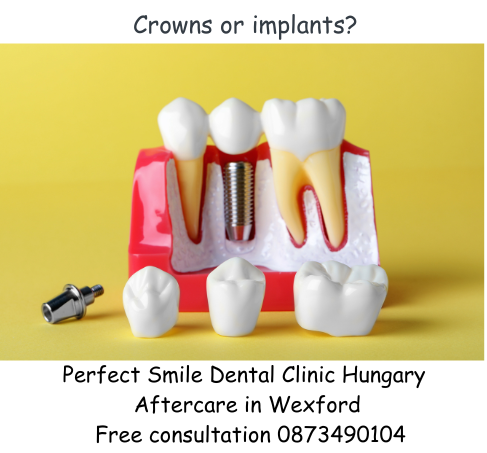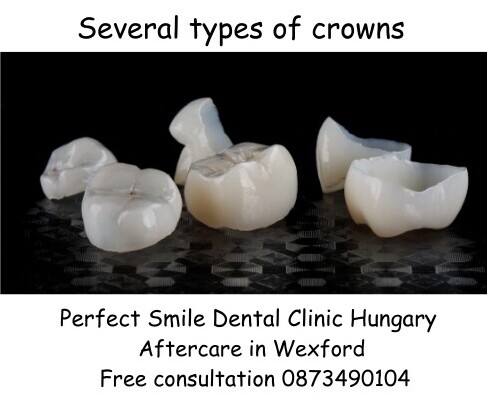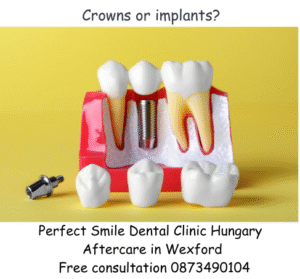Crowns or implants
Are you in need of professional advice on the question of crowns or implants.?
Hungarian Dentists Wexford are here to help you on all matters to do with dental crowns and implants, call Fintan 0873490104 to learn more.
Here is all the information that you need on crowns or implants, the pros and cons, cost and which treatment is best for you.
Dental crowns and implants are two popular options for restoring damaged or missing teeth.
If you have ever been told you need one, you might wonder about the differences, what each involves, and which choice could work for you.
In this article, I’m breaking down everything that I know to help you weigh crowns and implants so you can step into your dentist’s clinic feeling informed and ready to decide.

Understanding Crowns and Implants
Crowns and implants solve different dental problems, but I’ve learned that the terms are sometimes mixed up. Here’s what each means.
A crown is a tooth shaped ‘cap’ placed over a damaged or worn down tooth to bring back its shape, size, strength, and appearance.
Dentists often recommend a crown after a root canal, a large cavity, fractures, or just general wear and tear.
An implant is a replacement for an entire missing tooth. It includes a small titanium post surgically placed into the jawbone.
This post acts like the root of a tooth, topped with a crown for chewing and aesthetics. Implants are a strong and long lasting way to fill in for a tooth that is no longer there.
Picking between a crown or an implant depends a lot on the condition of your tooth, your oral health, and even your budget preferences.
Each option fills a role in keeping your smile looking and working its best.
My name is Fintan Duggan, I have been to Perfect Smile dental clinic in Hungary for treatment, I have the experience and I can help.
I’m a local person to contact about crowns or implants and a free consultation in Hungarian dentists Wexford, call me now 0873490104.
When Might You Need a Crown?
If you still have a natural tooth but it’s been weakened or broken, a crown can offer protection and restore function.
Our Hungarian dentist has explained that crowns are also used to hold together cracked teeth or to cover teeth that have large fillings when the natural tooth structure can’t support chewing.
Crowns are a great solution when:
- There is a chipped or cracked tooth: The crown covers and supports what’s left, keeping your bite strong.
- After a root canal: Teeth can become fragile; a crown helps keep them from breaking apart.
- For cosmetic improvements: Whether you have discolored or oddly shaped teeth, crowns can help boost the look and feel.
- To reinforce a worn tooth: Grinding or acid erosion may have thinned your enamel, and a crown can restore lost height and function.
Crowns are made in dental labs to match your tooth’s color and shape, so they blend right in. They also make eating and talking easier, giving you back confidence in your everyday activities.

When Might You Need an Implant?
If your tooth is missing or so badly damaged it can’t be saved, an implant steps in as a full replacement.
When a patient of Perfect Smile dental clinic in Hungary lost a molar in a sports accident, our dentist told her an implant would help keep her jaw healthy and her bite in line.
Because gaps cause neighboring teeth to move and the jawbone to weaken with time.
Dentists suggest implants for cases like:
- Single tooth loss: Whether from injury or decay, an implant stands in for the lost root and tooth.
- Multiple missing teeth: Implants can support bridges or even full dentures, making them much steadier than traditional removable tooth options.
- No teeth at all: Implants can anchor a full set of replacement teeth comfortably and securely.
- Jawbone health: Implants help the bone stay strong because they act like natural tooth roots, stopping bone loss that happens when no tooth is present.
Implants help maintain your face’s appearance too. Without stimulation from tooth roots, the jaw can shrink, which might make cheeks look sunken.
By filling the gap, implants keep your facial structure intact, which is a big factor for many people.
My name is Fintan Duggan, I have been to Perfect Smile dental clinic in Hungary for treatment, I have the experience and I can help.
I’m a local person to contact about crowns or implants and a free consultation in Hungarian dentists Wexford, call me now 0873490104.

What’s Involved in Each Treatment?
Getting a Crown
Getting a crown usually takes one dental visits to Perfect Smile in Hungary.
First, our experienced dentist shapes the tooth and takes an impression or digital scan to send to the dental lab, where the crown is made.
Sometimes, you’ll get a temporary crown while you wait. On the second visit, the permanent crown is fitted, adjusted for bite, and cemented in place.
The tooth can feel a bit sensitive afterward, but normal chewing is restored quickly.
Crowns can be made out of ceramic, porcelain, metal, or a combination.
Our Perfect Smile dentists will help you choose the best material for your needs.
After your crown is in, you treat it just like your other teeth with brushing and flossing. It can last years if you look after it.
Getting an Implant
Implant treatment happens in stages over 4-6 months, based on what past treatments have shown.
Our Hungarian dentist first checks that your jawbone is healthy enough. The implant post is placed into the bone through minor oral surgery.
Over the next few months, the bone grows around the post, making it super stable.
A small connector called an abutment is added, and then the final crown is attached on top.
There’s a healing period involved, and regular checkups in Wexford help track your progress.
Some people need a bone graft if the bone isn’t thick enough for the implant; our dentist will check for that in your first appointment.
The process takes patience but the result is a sturdy, natural looking tooth that feels just right when speaking and eating.
Pros and Cons: Crowns vs. Implants
My dentist helped break down some practical differences you might want to keep in mind when weighing your options:
- Longevity: Implants can last many years, sometimes a lifetime, with good care, while crowns typically last 10–15 years before needing replacement due to wear or decay around the original tooth.
- Cost: Implants usually cost more because of the surgical steps and materials. Crowns are generally less expensive if your tooth’s root is still healthy.
- Procedure time: Crowns are a lot quicker to place, often in a couple weeks. Implants take months from start to finish, including healing. This matters if you want a faster solution.
- Natural tooth preservation: Crowns save your own tooth when possible, which some find really important. Implants require removal of the whole tooth, including its root, if that hasn’t already happened.
- Jawbone support: Implants prevent the bone loss that often happens after a tooth is lost, while crowns do not address this.
It’s a good idea to think about your own needs and the advice your dental team provides before choosing.
My name is Fintan Duggan, I have been to Perfect Smile dental clinic in Hungary for treatment, I have the experience and I can help.
I’m a local person to contact about crowns or implants and a free consultation in Hungarian dentists Wexford, call me now 0873490104.

What to Consider Before You Decide
Making a choice depends on your dental goals, what your dentist recommends, and what you feel comfortable with medically and financially. Here’s what helped me choose:
- Your dental health: If the root and bone are healthy, a crown could make sense. For teeth that are gone or can’t be saved, an implant is often the better call.
- Commitment: Implants need more healing time and patience, while crowns are more straightforward and require less recovery.
- Budget and insurance: Crowns are often covered more fully by dental insurance, but it’s worth checking your policy since some plans now cover part of dental implants, especially if the loss affects your ability to eat or speak.
- Future plans: Think about your long term needs. If you expect to lose more teeth in the future, an implantsupported bridge might work well down the road.
Talking things over with your dental provider can clear up questions and help you feel secure in your decision. If you’re ever unsure, ask about second opinions or try to talk to others who have had the procedures done.

Common Questions About Crowns and Implants
Does a crown hurt?
Getting a crown is similar in discomfort to getting a filling, but your dentist will use local anesthesia, so pain is rare. There may be some sensitivity after the first appointment, but it settles quickly.
Is a dental implant painful?
The surgery is done under anesthesia, so you won’t feel pain during the procedure. You may have some soreness for a few days after, which is usually managed with over-the-counter pain relief.
How do I take care of crowns and implants?
I brush, floss, and visit my dentist as recommended. Both crowns and implants require regular cleaning just like real teeth to prevent gum issues or problems at the edges of the crown.
Are implants safe?
Implants are safe for most adults. People with certain health issues like uncontrolled diabetes or smokers might need special consideration or may not be ideal candidates. Your dentist will check in and make sure an implant is right for you.
Real Life Examples and How to Decide
If you have a tooth with a big filling but a strong root, our experience is that a crown keeps it working for many more years.
If you’re missing a tooth completely or if the root has an infection that can’t be solved, an implant is going to offer the stability and chewing power that matches a real tooth.
For example, one of my relatives had a bad break in a front tooth and a root canal couldn’t save it, so she chose an implant for both durability and appearance.
On the other hand, after a root canal, a crown helped with chewing and smiling with confidence again without needing surgery or extra healing time.
- Implant placement in the back of the mouth: My friend got an implant for a missing molar, which helped her chew tough foods and stopped her other teeth from drifting out of position.
- Getting a crown after grinding: I grind my teeth at night, which wore down one of my molars. After a crown was placed, my bite felt stable and eating was comfortable again.
Both treatments offer real benefits with daily comfort, confidence, and better oral health.
If you face a similar choice, consider all angles: durability, esthetics, cost, and how much downtime you can handle.
Reading stories from others may help you see more clearly which direction to take.
My name is Fintan Duggan, I have been to Perfect Smile dental clinic in Hungary for treatment, I have the experience and I can help.
I’m a local person to contact about crowns or implants and a free consultation in Hungarian dentists Wexford, call me now 0873490104
Choosing What’s Right For You
The right dental restoration depends on what you want, your dentist’s assessment, and what will last the longest with your oral health habits.
Crowns and implants both offer strong solutions for restoring your teeth and confidence.
Listening to the advice of our dental team, thinking about costs and time, and being realistic about your own habits makes a big difference in satisfaction with the treatment you choose.
Having been through both types of treatments, I encourage anyone facing this decision to ask lots of questions, understand your options, and go with what feels best for your smile, health, and peace of mind.
Wrapping up, whether you’re considering a crown for a tooth that’s hanging on or thinking about setting things right with an implant.
Both options are effective ways to bring function and a natural look back to your smile.
Stay proactive with dental appointments, care routines, and keep asking questions, so you can track down the best outcome for your individual situation.
References
https://pubmed.ncbi.nlm.nih.gov/38734300/

